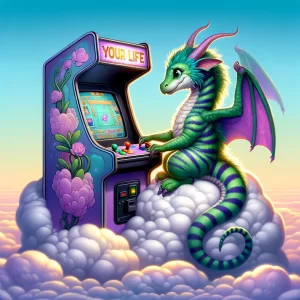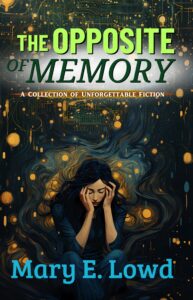by Mary E. Lowd
Originally published in Bards & Sages Quarterly, Volume IV, Issue 3, July 2012

Dennis took a bow and left the stage for his last time. He gripped arms with his brother and fellow band member; they grinned at each other and agreed it had been a good set. Cameras flashed, and fans shoved photos of him, hopefully, his way. He signed a few autographs, kissed a few girls, and made it to his car. This was the life. His job was being famous and adored, maybe singing a little too. When his day’s work was done, he could head over to a party. There was always a party, every night. Tonight, the party was at the docks, on a house boat. It would be good, lots of new stuff to try… and Dennis tried it. The evening became swimmy before his eyes. The more stuff Dennis tried, the swimmier it became. Eventually, he started to feel like swimming. He remembered good old days, before everything got out of control. He used to go swimming then, just for fun. Now it was all commercial. The pressure was… so great. Maybe, if he could just go swimming again… just feel the water passing by him… flowing…
Dennis found himself standing by the edge of the boat, looking at the water. It shone, not with reflected light, but with its own spiritual light from within. Spirituality, that’s what they’d lost. If he could just go swimming, maybe he’d find it again. Dennis stepped over the railing, and, leaning into the cold, night air, he called back to his friends. “I’m looking for something I lost…” He jumped before they could respond.
The plunge took Dennis deep into the icy water. Dark, cold, and wet enfolded him, enclosed him, and promised to never let him go. A last gulp, and not a gulp of air. Dennis died.
Or did he? The cold and wet that held him so firmly began to recede. Dennis felt himself standing on his feet. His mind felt strange. His back was warm… his body felt strange. Memories started to return to him, but they were not memories of his life as Dennis. They were longer, older memories. Dennis felt like a moviegoer, sitting in a theater, when the lights come up. It was like the moment when, suddenly, you’re no longer Marlon Brando in On The Waterfront; you’re just you. But who was Dennis?
Remembering himself, the creature who had so recently been Dennis sighed. He felt old. His was too long a life. To die like Dennis had… Like he had, just a moment ago, when he was Dennis… If only it would stick. He could die a million times, as a million different people, and every time he would come back. Such was the curse of being a Sheltorianack.
Dennis, or rather the Sheltorianack who had recently been Dennis but had now returned to being Csive, opened his eyes to the devastatingly familiar sight of The Arcade. The game before him, the one that let him live the life of Dennis, was flashing its lights, telling him that he’d died and the game was done. A Sheltorianack behind him, growing impatient, tapped him on the shoulder. “If you’re done, buddy,” it growled, “then move along.”
Csive turned his ancient self around. The line behind him was long. He remembered standing in line a thousand times for a thousand years each time to be Dennis. It was one of the popular games, although not nearly as popular as John Lennon. Glamour. Rock stars. Those kinds of games were popular. In fact, they were second only to great political leaders. Csive remembered being Napoleon a few eons back. He’d liked Joan of Arc better. He played at being her at least a trillion times in a row once. Right now, he couldn’t quite remember why… It was an awfully long line for such a short, piously tame life. It must have been one of his moods.
For members of an immortal race, moods last a very long time. They come and go, and most Sheltorianacks have gone through all flavors of them more than several times. The stripy, green and purple fellow behind Csive, the impatient one, was clearly going through a particularly flamboyant phase. He was rude, impatient, and reactive. He’d decked himself out with bangly bracelets and loud clothes, mostly in hideous oranges. It would get him nowhere. In a couple millennia he would tire of it. Perhaps then he would become depressed and reflective like Csive. Until then, Csive figured, it was probably better to keep out of his way, so Csive excused himself from the front of the line. With a grunt of satisfaction, the impatient and gaudily dressed Sheltorianack moved into place and dropped his token in the arcade machine.
Csive wandered around the glaring halls of The Arcade aimlessly. He considered leaving the human section, going to a section with games from a different universe. He could play Grangledor of Azton IV again. That was a particularly fun life. Except, Csive just didn’t care enough. This was a bad phase he was in. He didn’t remember ever feeling so low before, so much as if life, all life, was pointless. But, he’d lived such a very long time, he probably had felt this way many times before. He’d probably even felt worse. He couldn’t even revel in his depths of depression being novel or new.
Eventually Csive, unable to muster the enthusiasm necessary to stay standing in a line long enough to get to the front of it, ended up playing a game he found tucked away in the corner without any line. Csive dropped a token in the machine and felt his memories drain out of him. He did like that feeling. It made the monotony of infinity briefly disappear. A moment later, in Sheltorianack time, Csive returned to being himself, much as he had after being Dennis. He remembered playing this game before: Jim Tyson was an accountant, who was teased a lot during his early childhood, never knew how to talk to girls, lived sixty-three years without ever marrying, and died in his bed from heart failure. It was a boring life; it was a boring game. Csive dropped another token in to play a couple more thousand times before he couldn’t take that particular brand of boredom anymore.
After wandering among the games a few eons longer, including a break where Csive chose to stand on one foot as long as could, which turned out to be a rather long time, Csive happened on the arcade game that’s you. Csive dropped a token in, and he was born as you, lived your life, and died. He returned to being Csive. That was a pretty good game, he thought. Immediately afterwards, the thought depressed him. He would have played the game again, but he couldn’t stand the idea of being you again, knowing he’d only return to being himself afterwards. Besides, he’d played every game in The Arcade an uncountable number of times before. Csive left The Arcade and went home.
On the way home, Csive was struck by a horrible, terrible, morbidly fascinating idea. He couldn’t, despite many attempts, get it out of his head. It was the first new idea he’d had in… well, more years than you and all the people you’ve ever known have lived, all put together and multiplied by the number of carbon atoms in all of your bodies. To think of a new idea… the wonder, the happiness! But it was a horrible idea, Csive reminded himself, and it could only bring him pain. But… it was new.
Csive, in spite of himself, found himself building a new arcade game to test his idea. It was an arcade game like no other, the first of it’s kind. A small voice, the voice of reason, a voice little listened to when in the throws of a deep depression, suggested to Csive that hopefully this machine would not only be the first but also the last of its kind. In fact, the tiny, beleaguered voice suggested, maybe it shouldn’t even be the first…
Csive, in a passion, didn’t listen. Novelty was all he had to live for at the moment, and since his immortality left him no choice but to live, he was left with little choice but to pursue the dangerous novelty.
Finally, the new game machine was done. It stood before Csive, flashing its displays, blinking its lights, enticing him to play. It would be stupid… beyond stupid… more impossibly horrible than anything that any of the people he’d ever been could imagine… to play such a game. Their lives were too small to allow comprehension of such a horror.
Csive stood before the machine for minutes, hours, days, years, eons…a time as long as our universe has existed and longer. He couldn’t care about anything enough to convince himself to take one step away from the machine. He dropped a token in.
Csive began his own, immortally long and now fractally longer, life again.
Read more stories from The Opposite of Memory:
[Previous] [Next (coming soon!)]

